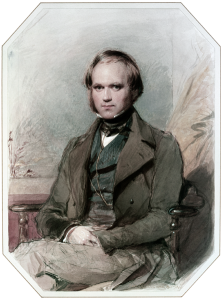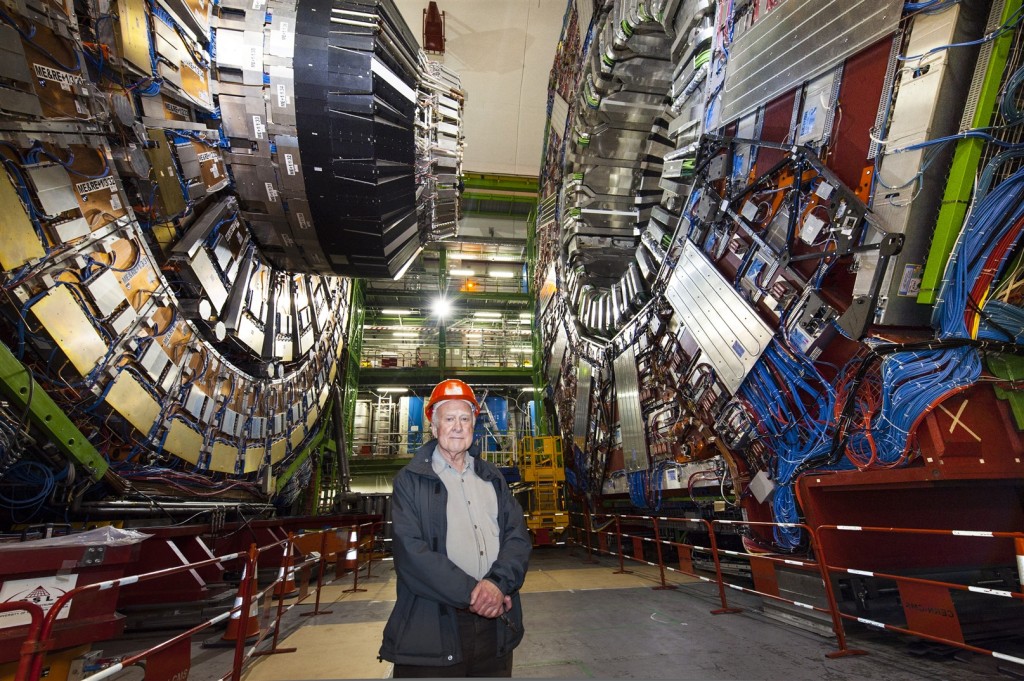God has given us a clear history in the biblical account. Genesis Chapter 1, from a straightforward reading, describes the history of the planet Earth, the solar system and the whole universe starting not much more than 6000 years ago. This is based on the genealogies, the historical records of father and son, found written in chapters 5 and 11. Add these up and eventually you get to a point in history that is well-known and then you have an estimate of the time that has passed since creation. This exercise will only result in a history of about 6000 years.
Then why is this so hard for many people to accept? The answer does not really lie with science. It is because most people believe anything they are told if it comes with the stamp of approval of science. This is actually scientism not science. It is a belief system, a worldview; a worldview that man’s knowledge through science has all the answers or that science ultimately will find all the answers.
Deep time

In the 1700s James Hutton advanced the idea of long ages of earth history. Hutton observed in the rock strata (in the geology around him) slow and gradual changes in the present and extrapolated the idea over long periods of time (uniformitarianism); over periods of time that no man could have observed. Hence he developed the idea of deep time—that Earth had millions (which later grew to billions) of years of history. Charles Lyell extended these ideas and propagated them through his books. Charles Darwin in 1839 travelled on board the HMS Beagle, for 5 years, down to South America, taking a copy of Lyell’s book “Principles of Geology I”. This gave him the idea of the time, long time periods, he needed for biological evolution to change the simplest organisms into the complex over the needed millions of years. Deep time was all he needed. He supposed if we see small changes in living things all that was needed was lots of time and you could have big changes–which was his speculation now called evolution. But Darwin began as a geologist looking for evidence of millions of years in the rocks.

Eventually meteorites were found that were ‘dated’ as 4.55 billion years old. According to those dates they were older than any Earth rocks and therefore it is believed they must represent the age of the solar system. That age has remained essentially unchallenged. The worldview dictates what the evidence means. So as long as the worldview is held to be true the ages are never challenged. ‘Spurious’ ages are rejected as not fitting the nebula hypothesis for the formation of the solar system.
As time passed more time was needed in the cosmos. Some globular star clusters were found to be older than the Galaxy and even the universe itself, according to the way their age was determined. In the cosmos a set of tenuous measurements were made that people would use to assign age to some object. These, like Hutton’s uniformitarianism, required unprovable assumptions.
 Astronomers looked at spiral galaxies and saw only ‘several hundreds of millions of years’ of age in the few turns of the spiral structure. Yet the big bang is believed (note, believed) to have initially produced all the matter of the universe. And all galaxies first started to form only a billion years after the big bang. Here was a contradiction. The observed galaxies must be at least 10 billion years old but based on their spiral swirls they are 50 times less than that. They appear not to have turned enough times since they first formed. The resolution was easy—we don’t understand how spiral galaxies swirl. This came in the form of the advancement of the density wave theory, which is supposed to solve this and save the 10-billion-year age of galaxies. But the belief system motivates the advancement of the theory. Not the other way round.
Astronomers looked at spiral galaxies and saw only ‘several hundreds of millions of years’ of age in the few turns of the spiral structure. Yet the big bang is believed (note, believed) to have initially produced all the matter of the universe. And all galaxies first started to form only a billion years after the big bang. Here was a contradiction. The observed galaxies must be at least 10 billion years old but based on their spiral swirls they are 50 times less than that. They appear not to have turned enough times since they first formed. The resolution was easy—we don’t understand how spiral galaxies swirl. This came in the form of the advancement of the density wave theory, which is supposed to solve this and save the 10-billion-year age of galaxies. But the belief system motivates the advancement of the theory. Not the other way round.
Then it was noticed that comets are still entering our solar system. But if the solar system formed 5 billion years ago why are not all the comets used up? Comets almost evaporate approaching the sun and many are destroyed on their path through inner solar system. But the belief system—the worldview—to the rescue. It was proposed that because the solar system has been around 5 billion years, there must be some huge, yet unobserved, cloud of cometary material—called the Oort Cloud—way outside, but in a spherical halo around, the solar system. It is alleged that the Oort cloud has had sufficient mass to fuel the comets for all that time.
Scientism is not science
Then after the speed of light was measured to be a large number, yet still finite, it was suggested that the universe must be truly old. How could light from the most distant galaxies travel some 10 billion light-years to earth since creation? How could the 6000 year history of the Bible still be true? They would argue that obviously over the passage of 6000 years, light could only travel 6000 light-years. After all that is the definition of a light-year, a unit of distance.
See, this is not science. This is scientism. The mind is already set on a particular worldview and it is not the biblical worldview. By building one assumption on another they have developed a complex set of assumptions that masquerade as science. This paradigm generally goes unchallenged.
When a challenge is made it is not by way of new observations but by a new interpretation of the evidence. Yet the same observations are totally consistent with the biblical timeline for the whole universe. There is no contradiction between the biblical history and what we observe. It is only in the mind of the unbeliever that any contradiction exists.

The key is at the heart of another problem, which was solved by Einstein—with his relativity theory. He correctly understood that time is not an absolute in the universe. The rate at which time passes is relative to the motion and position of the observer. Time is never the same for all observers. So to impose a notion on the universe that it must be billions of years old because light must take billions of years to get from the most distant galaxies to Earth is imposing a particular interpretation on the evidence.
No human knows everything and all scientists have a worldview, a religious belief system. Only through that do they interpret the evidence they see. For science to claim as fact an assertion which is unprovable—namely how old something is—is pure scientism. This applies to geology, biology, cosmology; all forms of scientific endeavour.
You might be looking at evidence, like, a fossil in a rock, or a meteorite, or hundreds of thousands of sedimentary layers (e.g. in Grand Canyon), or galaxies at very large redshift (large redshift supposedly implying great distance), yet none of these tell you how old they are. Only by applying a set of assumptions is an age determined.
Conclusion
The answer to the title question is because mankind does not want to believe in a universe with a Creator who made it and them. This is because the Creator might require of man, who is truly wicked by nature (meaning he is selfish and desires his own above all else), a moral code that he does not want to live by. So to reject the Creator, mankind rejects the notion of the created universe, and instead says that it evolved by random chance processes and the laws of physics. That gets him off the hook, so he thinks.
Those who believe in a Creator yet accept the worldview of scientism are acting irrationally. It would seem to me that they are ashamed of the Creator’s Words and choose to rely on the world to interpret what He plainly said.
Download this article as a PDF tract.
Recommended Resources:
- Book: Dismantling the Big Bang: God’s Universe Rediscovered
- Anisotropic Synchrony Convention —A Solution to the Distant Starlight Problem
- Distant Starlight: The Anisotropic Synchrony Convention
- The Anisotropic Synchrony Convention model as a solution to the creationist starlight-travel-time problem
- Book: Hubble Bubble Big Bang in Trouble






12 responses to “Why is a 6000-year-old universe so hard to believe?”
Hi John,
It is great to hear a scientist openly make the distinction between science and scientism. Before reading your post, the only others I’ve seen make this distinction is philosophers (like Bill Vallicella).
Among scientists, I get the impression that some of them become uncomfortable when words like scientism are used to describe their attitude and philosophy. Could you offer some reasons why certain scientists feel uncomfortable with the term?
LikeLike
When you think about the life of a scientist–it is not a 9 to 5 job but absorbs his whole self. He has a lot invested in his career with all his ‘discoveries’ produced through the peer-reviewed process. So he must hold tightly to what he believes or else his whole existence comes under question. I remember asking Jim Gates (http://en.wikipedia.org/wiki/Sylvester_James_Gates) about his belief in String Theory. He said if he is wrong he has just wasted the past 40 years of his life. This typifies the reason why they hold so tightly to a belief system and why they must reject all challenges to it, even to label it a belief system. They often try to distinguish their science from beliefs, or religion. I think they know deep down it is a philosophy but it is about defending reputation. Even to the point of attacking creationism and calling it pseudoscience. That is just petty name calling.
LikeLike
Hi Dr. Hartnett, has there been found any evidence for an Oort cloud?
LikeLike
Just do a google search on “observations of the Oort cloud” and all hits will tell you the same thing–no sightings, no evidence, no observations. It is believed to exist by faith because the worldview requires it to exist else we would have a problem explaining the existence of comets today. I did such a search and here is a quote from the site listed below: “This shell, more commonly known as the Oort cloud, is believed to be a remnant of the early Solar System.” Note emphasis on ‘believe.’ Then the article goes on to claim some sighting of a body that is trans-Neptunian must have been kicked out of the putative Oort cloud. But this is still the same type of story telling. More story telling here: http://www.universetoday.com/102406/mysterious-and-well-preserved-oort-cloud-object-heading-into-our-solar-system/#ixzz2yct4hVI4
LikeLike
I pointed out to an angry atheist that the Oort cloud was only theoretical. He called me a liar because Voyager passed through it. Uh, yeah…
LikeLike
Thanks, telling then that the article you linked to, presumes the Oort cloud without any evidence.
LikeLike
Hi John,
On my “To Do” list is to order the DVD with Russ Humphrys and yourself discussing your cosmologies. I must admit until I read “Starlight and Time” the biggest stumbling block to my acceptance of a young universe was the starlight problem. I have a friend who is an astronomer, who believes in Jesus but not in the scriptures. Scripture is untrustworthy due to copy errors and so forth. I’ve argued that a God of infinite power, etc., who can be foiled by mere human failings in creating scripture is hardly God to begin with. She disagrees, and ultimately I think it boils down to what you’ve said in this article. We all want to follow our own selfish desires, and a Real God might actually demand something of us.
LikeLike
Thank you for your work, your wisdom and your submission to the full authority of God’s Word. I believe the final answer to the enigma of vast distances in the Cosmos predicated on the speed of light will fully resolve one day and that resolution will involve considerations of sidereal time versus earth-solar time. Press on, brother John!
LikeLike
I have a question about the 10 billion year (big bang) and significantly less time spiraling galaxy assertion. Isn’t it plausible that the forces of nature i.e. gravity, electromagnetism strong and weak nuclear forces, could have taken millennia to condense such colossal beings such as the stars in a galaxy into the spiral form?
Also isn’t radioactive isotope dating established due to trial and error? Again these are questions based on my personal study and I would like opinions on their validity.
LikeLike
It is possible that given the right conditions galaxies could take not millennia to form into spiral structures but even hundreds of millions of years. Our own galaxy, based on measured speeds of stars and gases in the outer spiral arms, could take 200 millions years (of current earth time) to rotate once. The right conditions I mention though are ones that allow stars to form in the first instance. If you expect them to form just under the effects of gravity, you may have wait longer than the supposed age of the universe, due to heating effects of compressing a cloud of gas. For this reason unobserved dark matter is usually assumed. See discussion in the Comments section of 8 REASONS WHY EVOLUTION IS FOOLISH here.
The next question you must ask is, How much time is available? When was the galaxy created/formed? Big Bangers believe they started to form a billion years after the big bang. Since there was no big bang I don’t accept that as the origin of all matter. See The heavens declare a different story! But I do accept that there could have been billions of years of history in the cosmos, but I see that as part of the creative hand of God. All that we see essentially is part of His creation. He was not limited by the laws of physics, as we understand them today.
In response to your second question on the reliability of radioactive dating methods, again I suggest you look at the Comments section of 8 REASONS WHY EVOLUTION IS FOOLISH here. It is not uncommon where different decay processes are used in the same rock to date it; each decay process then gives a different date (all based on evolutionary assumptions, ie no initial daughter products etc). These differences are then interpreted in light of the evolutionary worldview, that the rock must have undergone some unusual history, which started one decay process as a different time to another. So the belief dictates the interpretation.
LikeLike
So, Dr, how come you attack science as a beliefsystem yet you hold a beliefsystem yourself? What is there to say that your beliefsystem is correct, or that your God and its teachings are true amongst tge thousands of beliefsystems there is?
The difference between science and religion is that science always reevaluates itself and its assumptions, and that these assumptions are based on basic scientific principles such as the natural forces which are both testable, observable and has a tendency to coincicide with their predicted behaviour.
If a man tells you he truly believes he is a dragon, would you agree he is in fact a dragon? Of course not, there are no evidence he is a dragon whatsoever. If you tell me that the earth is 6000 years old and this is based on bolls and scriptures written by men during a timeperiod of x thousand years, why should I believe you? The only evidence is your faith, much like the dragon-man and things people have written based on faith.
As for carbondating, lightspectra and lightwaves; these are observed and proven through countless of observations, experiments amd testing. The result remains the same.
Religion can’t even agree on which God is correct, let alone agree on who/what and how earth was created. Where are your experiments, predictions that always holds true amd your observable evidence?
I’d take highly likely probability (like 99.999999….9 %) over pure guesswork to explain reality. How about you?
LikeLike
I do not attack science as a belief system. I am a scientist myself and my work is in scientific research. My attack in the article is against the atheistic belief system, which follows from ‘scientism’, a religion that all answers to questions to life and everything else can be found in science. Unfortunately as a corollary ‘science’ has been defined nowadays as excluding the supernatural. Only materialism is permitted. But secondly we all hold to a belief system. I agree with you on that. It is only a matter of which belief system we hold to. After that, all evidence (which is the same for us all) is interpreted in light of that belief system, or worldview.
The phase ‘the difference between science and religion’ makes no sense because really we are talking about two religions, biblical Christianity and atheism. The latter takes its play book from scientism, which is quite distinct from science. If it was true that science re-evaluates itself and its assumptions etc etc then biological evolution as a theory would have been discarded long ago. But it is not that simple. It is a religion, a set of beliefs that determine how the evidence is interpreted. This is the nature of the problem. If some fossil is found to be discordant with past beliefs it is re-evaluated but still within the ruling paradigm. The paradigm itself is never under question. The say, “Oh we now know this occurred earlier than we previously thought.”
My faith in the Words of God is just that–faith. You have faith also, but in the words of man, fallible imperfect man. But my faith is not some blind-faith that you allude to with your dragon-man. I have my senses and it is not contrary to those. But we really are talking about the past, past events where there were no human observers, or witnesses. And the only way to know for sure of the veracity of a past event is by an eye-witness account.
Your quick throw away line on carbon dating, light spectra etc is flawed on so many levels. It is the assumptions that you are ignoring. No measurement actually directly determines the absolute age of a sample. Many assumptions are required and those assumptions are applied within the worldview of the researcher/observer. See here and here on radiocarbon and dating methods.
You speak of probabilities, but consider that in fact life which you believe formed from non-living chemistry 3.8 billion years ago without an iota of hard evidence and tell me who has the greater faith. See COSMIC EVOLUTION–MYTH OR FACT? Evolutionist don’t like to face the fact that the probability of life forming spontaneously even from pre-existing bio-molecules is so small (i.e. 1 in 10^50,000) that it is, in fact, impossible. Evolutionists have not a clue how it all began, in their belief system. My God is the Creator—uncreated always existing.
LikeLike